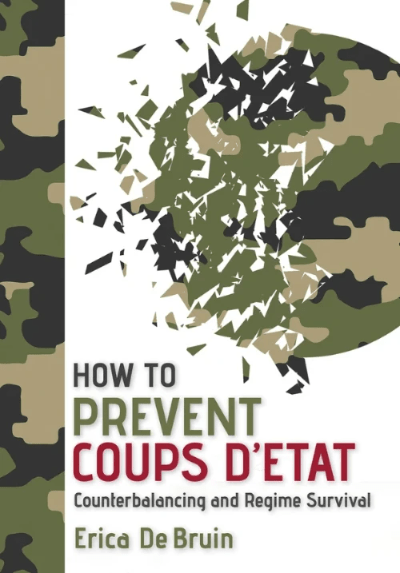

Why are some rulers able to head off challenges to their rule from their own armed forces, while others are not? How to Prevent Coups d’état argues that part of the answer lies in the ways in which rulers organize and use their coercive institutions. Where rulers counterbalance the military with presidential guards, militarized police, and militia, efforts to oust them from power are less likely to succeed. At the same time, however, this strategy can generate resentment within the military that ends up provoking new coup attempts. Drawing on an original dataset of coercive institutions in 110 countries over a span of fifty years, as well as case studies of coup attempts in Asia, Africa, Latin America, and the Middle East, the book sheds light on whether and how rulers can make their regimes impervious to coups. It shows that while counterbalancing may prevent successful coup attempts, it is a risky strategy to pursue—and one that may weaken regimes in the long term.
Purchase via Cornell University Press, Amazon, Google, Bookshop.
In case you are interested, here is a recent podcast discussion of How to Prevent Coups.
Review quotes
"Captivating and informative...should be a staple in any class on civil-military relations and read alongside classics including Eric Nordlinger’s Soldiers in Politics, Samuel Finer’s The Man on Horseback, and Samuel Huntington’s The Soldier and the State." —Ricardo A. Crespo, Journal of the Middle East and Africa
"The contributions of this book are significant. It exemplifies the excellent work on civil-military relations produced by junior scholars in the past decade...The argument is thorough and nuanced and the quantitative and qualitative analyses rigorous and convincing." —Peter B. White, Auburn University, H-Diplo
"Cogent and compellingly argued, her book shows us how a common tactic employed by autocrats...may help prevent, but may also at times encourage, conspiracies against the government. How to Prevent Coups d'État is a major contribution." —Risa Brooks, author of Shaping Strategy
"Changed the discussion in national security and civilian-military relations, and not just among coup scholars...De Bruin has paved the way for a more empirically-grounded study of coup-proofing." —Emily VanMeter, The Strategy Bridge
"Erica De Bruin's book offers the most comprehensive account to date of whether counterbalancing (or coup proofing) can deter coup attempts....[it] deserves to be read not only be academics and dictators, but by anyone interested in research on coups." —Jerg Gutmann, University of Hamburg, Journal of Peace Research
"De Bruin has meticulously collected a vast swath of original, reliable, global data and leveraged the data through an excellent research design to finally resolve debates about the design of coercive institutions and the impact on regime survival." —Caitlin Talmadge, author of The Dictator's Army
“Erica De Bruin’s excellent book is an important contribution to the scholarship on civil-military relations. She has identified a real lacuna in the literature, as those of us who have thought about coups rarely considered the role of counterbalancing institutions explicitly, let alone viewed them through a theoretical lens.” —Zoltan Barany, author of How Armies Respond to Revolutions and Why
Related media
- The book was recently recommended in the New York Times as useful for understanding both the recent mutiny in Russia and the conflict in Sudan between the military and paramiltary forces.
- 6+1 Questions about How to Prevent Coups, Duck of Minerva
- New Books Network Podcast, with Susan Liebell
- Interview about the book on the Departures Podcast with Robert Amsterdam
- Interview with Hamilton College about the book
- Excerpt from the first chapter on the Cornell University Press website
Contact
Erica De Bruin
Associate Professor
Government Department
Hamilton College
198 College Hill Road
Clinton, NY 13323
